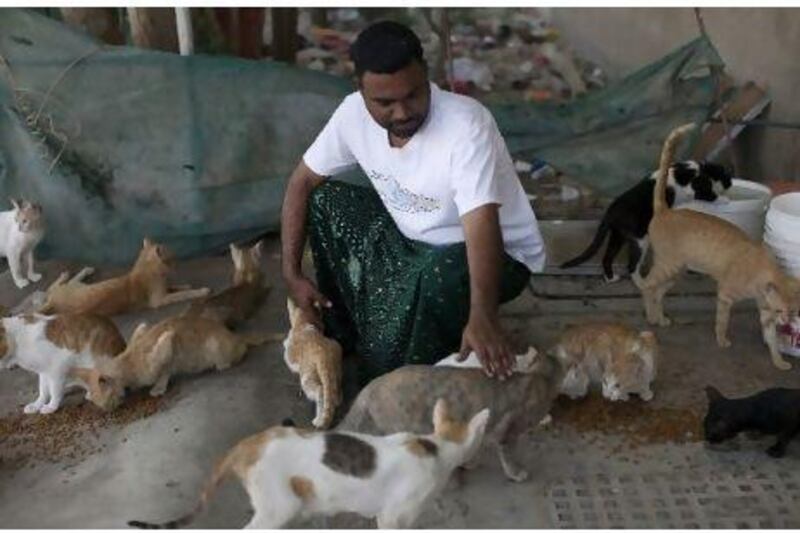ABU DHABI // Outside a dilapidated collection of concrete shacks that lack running water, Raju Cheriyan picks up a blue-eyed, fluffy, grey and white feline, which he and his fellow labourers have identified as their mascot.
"This cat in particular is a good cat," Mr Cheriyan says. "She is beautiful. Her mother was hit by a car, and we all started looking after her."
The 30 or so Indian and Pakistani labourers living at this camp on a dry patch of land in Musaffah are among the last to be relocated as part of a broader effort by the municipality to shift workers to new accommodation. The men are living in limbo, awaiting the outcome of a court case in which they say they are owed months of wages.
But another pressing concern is the fate of the 75 extra mouths they have been feeding for months - those of the stray cats that have slowly congregated around their makeshift lodgings.
A handful of buildings in the labour city have drawn hundreds of cats between them, seeking refuge as nearby compounds are torn down. The men at this camp have pooled part of their savings to buy dry food and small fish to feed the 75 animals that call the camp home.
They also carry buckets of water from a nearby mosque, and offer parts of their modest living quarters for relief from the relentless heat.
The men, who were employed by Emirates Electromechanical & Industry LLC before resigning four months ago, have been living off their savings to keep clothed and fed.
But when they are relocated to another camp in nearby Saniya in the coming days, they fear the worst for the adopted pets that they leave behind.
"God only knows what will happen to them when they bulldoze this building," says Mr Cheriyan, who has lived on the site for eight years. "If I could, I would take 100, 200, of them, but the new camp we are being moved to will not allow it."
Pam Greer, the education co-ordinator for Feline Friends Abu Dhabi, suggests that an outdoor shelter or enclosure be set up for the cats to protect them from the scorching summer heat.
"The worst-case scenario would be that there's no food, there's no water out there, and 300 cats basically die of dehydration and starvation," she said.
"That is a horribly inhumane thing to have happen."
Ms Greer fears the cats will not be able to fend for themselves because they have been cared for so well. Even the rubbish bins from which they often feed will soon be void of scraps.
"There was this huge honking rat running across the hall and the cats don't even budge," she said. "They don't need to look for food, and maybe they will, but a lot of them may not, they may just starve to death. They don't have that skill anymore."
Omar al Shoubaki, a pest control contract manager for The Centre for Waste Management, said the camp is private and therefore outside of the trap-neuter-release programme's jurisdiction.
But, he said, his department may still attempt to trap and sterilise the cats before releasing them back at the property.
The workers, meanwhile, are worried about their little ones.
"Now that it gets hot, they will not have water to drink or a place to hide from the sun," said Akbar Ali, who has lived at the camp for a year. "I am very afraid of what will happen to them. They cannot survive."
In a narrow hallway outside the workers' accommodation, Mr Cheriyan pulls out a small plastic tub. A layer of coins and paper money lies at the bottom.
"Everyone puts in two or five dirhams," he said. "We collect it, and spend Dh20 a day on food for the cats ... but we are only able to buy very cheap fish."
They worry most about the smallest kittens. In the corner of the kitchen, which is blackened with grime, a mother cat stands fiercely over her two babies.
"They are so tiny," says one worker, while the others stand and coo over the family. "They are maybe two, three days old?" he says.
Siddiq Ali, a local man who stops at the labour camp daily to feed the cats, said he has noticed the number of cats quickly swell at the remaining buildings.
"These men, they may have small wages, but they have big hearts," he said.
zalhassani@thenational.ae






